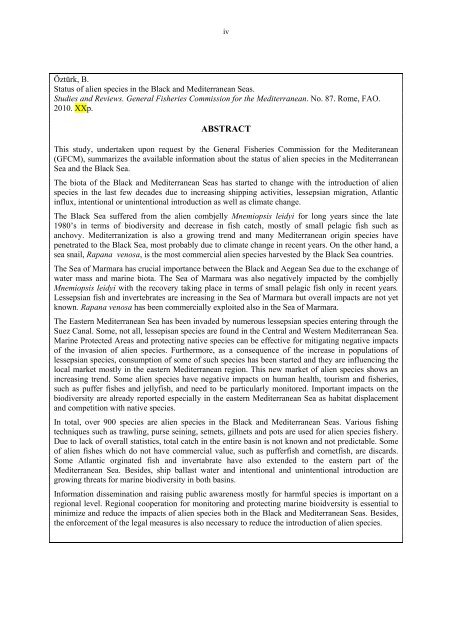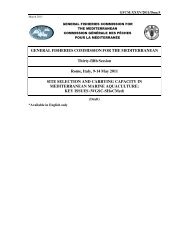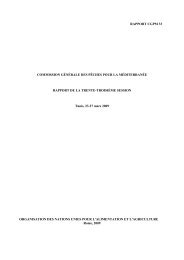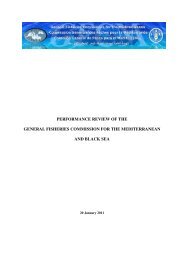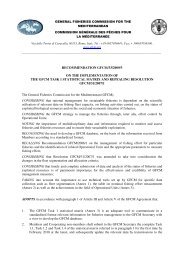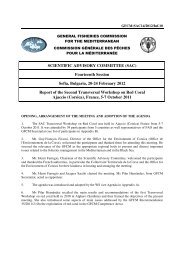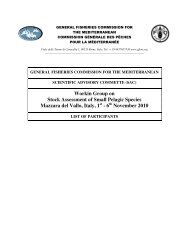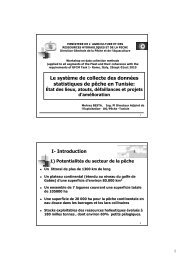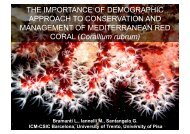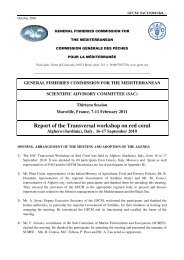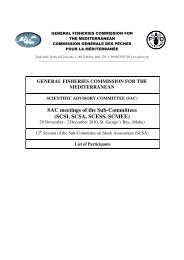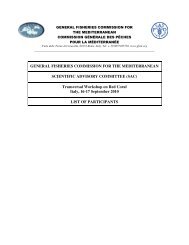Status of alien species in the Mediterranean and Black Sea
Status of alien species in the Mediterranean and Black Sea
Status of alien species in the Mediterranean and Black Sea
You also want an ePaper? Increase the reach of your titles
YUMPU automatically turns print PDFs into web optimized ePapers that Google loves.
Öztürk, B.<br />
<strong>Status</strong> <strong>of</strong> <strong>alien</strong> <strong>species</strong> <strong>in</strong> <strong>the</strong> <strong>Black</strong> <strong>and</strong> <strong>Mediterranean</strong> <strong>Sea</strong>s.<br />
Studies <strong>and</strong> Reviews. General Fisheries Commission for <strong>the</strong> <strong>Mediterranean</strong>. No. 87. Rome, FAO.<br />
2010. XXp.<br />
iv<br />
ABSTRACT<br />
This study, undertaken upon request by <strong>the</strong> General Fisheries Commission for <strong>the</strong> Mediteranean<br />
(GFCM), summarizes <strong>the</strong> available <strong>in</strong>formation about <strong>the</strong> status <strong>of</strong> <strong>alien</strong> <strong>species</strong> <strong>in</strong> <strong>the</strong> <strong>Mediterranean</strong><br />
<strong>Sea</strong> <strong>and</strong> <strong>the</strong> <strong>Black</strong> <strong>Sea</strong>.<br />
The biota <strong>of</strong> <strong>the</strong> <strong>Black</strong> <strong>and</strong> <strong>Mediterranean</strong> <strong>Sea</strong>s has started to change with <strong>the</strong> <strong>in</strong>troduction <strong>of</strong> <strong>alien</strong><br />
<strong>species</strong> <strong>in</strong> <strong>the</strong> last few decades due to <strong>in</strong>creas<strong>in</strong>g shipp<strong>in</strong>g activities, lessepsian migration, Atlantic<br />
<strong>in</strong>flux, <strong>in</strong>tentional or un<strong>in</strong>tentional <strong>in</strong>troduction as well as climate change.<br />
The <strong>Black</strong> <strong>Sea</strong> suffered from <strong>the</strong> <strong>alien</strong> combjelly Mnemiopsis leidyi for long years s<strong>in</strong>ce <strong>the</strong> late<br />
1980’s <strong>in</strong> terms <strong>of</strong> biodiversity <strong>and</strong> decrease <strong>in</strong> fish catch, mostly <strong>of</strong> small pelagic fish such as<br />
anchovy. Mediterranization is also a grow<strong>in</strong>g trend <strong>and</strong> many <strong>Mediterranean</strong> orig<strong>in</strong> <strong>species</strong> have<br />
penetrated to <strong>the</strong> <strong>Black</strong> <strong>Sea</strong>, most probably due to climate change <strong>in</strong> recent years. On <strong>the</strong> o<strong>the</strong>r h<strong>and</strong>, a<br />
sea snail, Rapana venosa, is <strong>the</strong> most commercial <strong>alien</strong> <strong>species</strong> harvested by <strong>the</strong> <strong>Black</strong> <strong>Sea</strong> countries.<br />
The <strong>Sea</strong> <strong>of</strong> Marmara has crucial importance between <strong>the</strong> <strong>Black</strong> <strong>and</strong> Aegean <strong>Sea</strong> due to <strong>the</strong> exchange <strong>of</strong><br />
water mass <strong>and</strong> mar<strong>in</strong>e biota. The <strong>Sea</strong> <strong>of</strong> Marmara was also negatively impacted by <strong>the</strong> combjelly<br />
Mnemiopsis leidyi with <strong>the</strong> recovery tak<strong>in</strong>g place <strong>in</strong> terms <strong>of</strong> small pelagic fish only <strong>in</strong> recent years.<br />
Lessepsian fish <strong>and</strong> <strong>in</strong>vertebrates are <strong>in</strong>creas<strong>in</strong>g <strong>in</strong> <strong>the</strong> <strong>Sea</strong> <strong>of</strong> Marmara but overall impacts are not yet<br />
known. Rapana venosa has been commercially exploited also <strong>in</strong> <strong>the</strong> <strong>Sea</strong> <strong>of</strong> Marmara.<br />
The Eastern <strong>Mediterranean</strong> <strong>Sea</strong> has been <strong>in</strong>vaded by numerous lessepsian <strong>species</strong> enter<strong>in</strong>g through <strong>the</strong><br />
Suez Canal. Some, not all, lessepisan <strong>species</strong> are found <strong>in</strong> <strong>the</strong> Central <strong>and</strong> Western <strong>Mediterranean</strong> <strong>Sea</strong>.<br />
Mar<strong>in</strong>e Protected Areas <strong>and</strong> protect<strong>in</strong>g native <strong>species</strong> can be effective for mitigat<strong>in</strong>g negative impacts<br />
<strong>of</strong> <strong>the</strong> <strong>in</strong>vasion <strong>of</strong> <strong>alien</strong> <strong>species</strong>. Fur<strong>the</strong>rmore, as a consequence <strong>of</strong> <strong>the</strong> <strong>in</strong>crease <strong>in</strong> populations <strong>of</strong><br />
lessepsian <strong>species</strong>, consumption <strong>of</strong> some <strong>of</strong> such <strong>species</strong> has been started <strong>and</strong> <strong>the</strong>y are <strong>in</strong>fluenc<strong>in</strong>g <strong>the</strong><br />
local market mostly <strong>in</strong> <strong>the</strong> eastern <strong>Mediterranean</strong> region. This new market <strong>of</strong> <strong>alien</strong> <strong>species</strong> shows an<br />
<strong>in</strong>creas<strong>in</strong>g trend. Some <strong>alien</strong> <strong>species</strong> have negative impacts on human health, tourism <strong>and</strong> fisheries,<br />
such as puffer fishes <strong>and</strong> jellyfish, <strong>and</strong> need to be particularly monitored. Important impacts on <strong>the</strong><br />
biodiversity are already reported especially <strong>in</strong> <strong>the</strong> eastern <strong>Mediterranean</strong> <strong>Sea</strong> as habitat displacement<br />
<strong>and</strong> competition with native <strong>species</strong>.<br />
In total, over 900 <strong>species</strong> are <strong>alien</strong> <strong>species</strong> <strong>in</strong> <strong>the</strong> <strong>Black</strong> <strong>and</strong> <strong>Mediterranean</strong> <strong>Sea</strong>s. Various fish<strong>in</strong>g<br />
techniques such as trawl<strong>in</strong>g, purse se<strong>in</strong><strong>in</strong>g, setnets, gillnets <strong>and</strong> pots are used for <strong>alien</strong> <strong>species</strong> fishery.<br />
Due to lack <strong>of</strong> overall statistics, total catch <strong>in</strong> <strong>the</strong> entire bas<strong>in</strong> is not known <strong>and</strong> not predictable. Some<br />
<strong>of</strong> <strong>alien</strong> fishes which do not have commercial value, such as pufferfish <strong>and</strong> cornetfish, are discards.<br />
Some Atlantic org<strong>in</strong>ated fish <strong>and</strong> <strong>in</strong>vertabrate have also extended to <strong>the</strong> eastern part <strong>of</strong> <strong>the</strong><br />
<strong>Mediterranean</strong> <strong>Sea</strong>. Besides, ship ballast water <strong>and</strong> <strong>in</strong>tentional <strong>and</strong> un<strong>in</strong>tentional <strong>in</strong>troduction are<br />
grow<strong>in</strong>g threats for mar<strong>in</strong>e biodiversity <strong>in</strong> both bas<strong>in</strong>s.<br />
Information dissem<strong>in</strong>ation <strong>and</strong> rais<strong>in</strong>g public awareness mostly for harmful <strong>species</strong> is important on a<br />
regional level. Regional cooperation for monitor<strong>in</strong>g <strong>and</strong> protect<strong>in</strong>g mar<strong>in</strong>e bioidversity is essential to<br />
m<strong>in</strong>imize <strong>and</strong> reduce <strong>the</strong> impacts <strong>of</strong> <strong>alien</strong> <strong>species</strong> both <strong>in</strong> <strong>the</strong> <strong>Black</strong> <strong>and</strong> <strong>Mediterranean</strong> <strong>Sea</strong>s. Besides,<br />
<strong>the</strong> enforcement <strong>of</strong> <strong>the</strong> legal measures is also necessary to reduce <strong>the</strong> <strong>in</strong>troduction <strong>of</strong> <strong>alien</strong> <strong>species</strong>.


